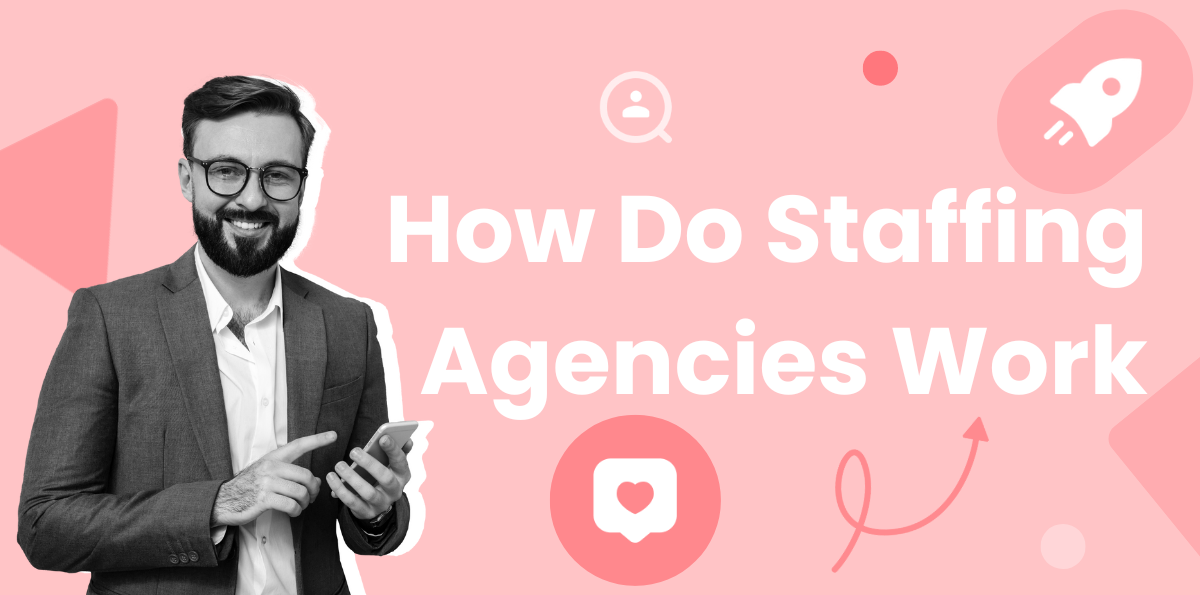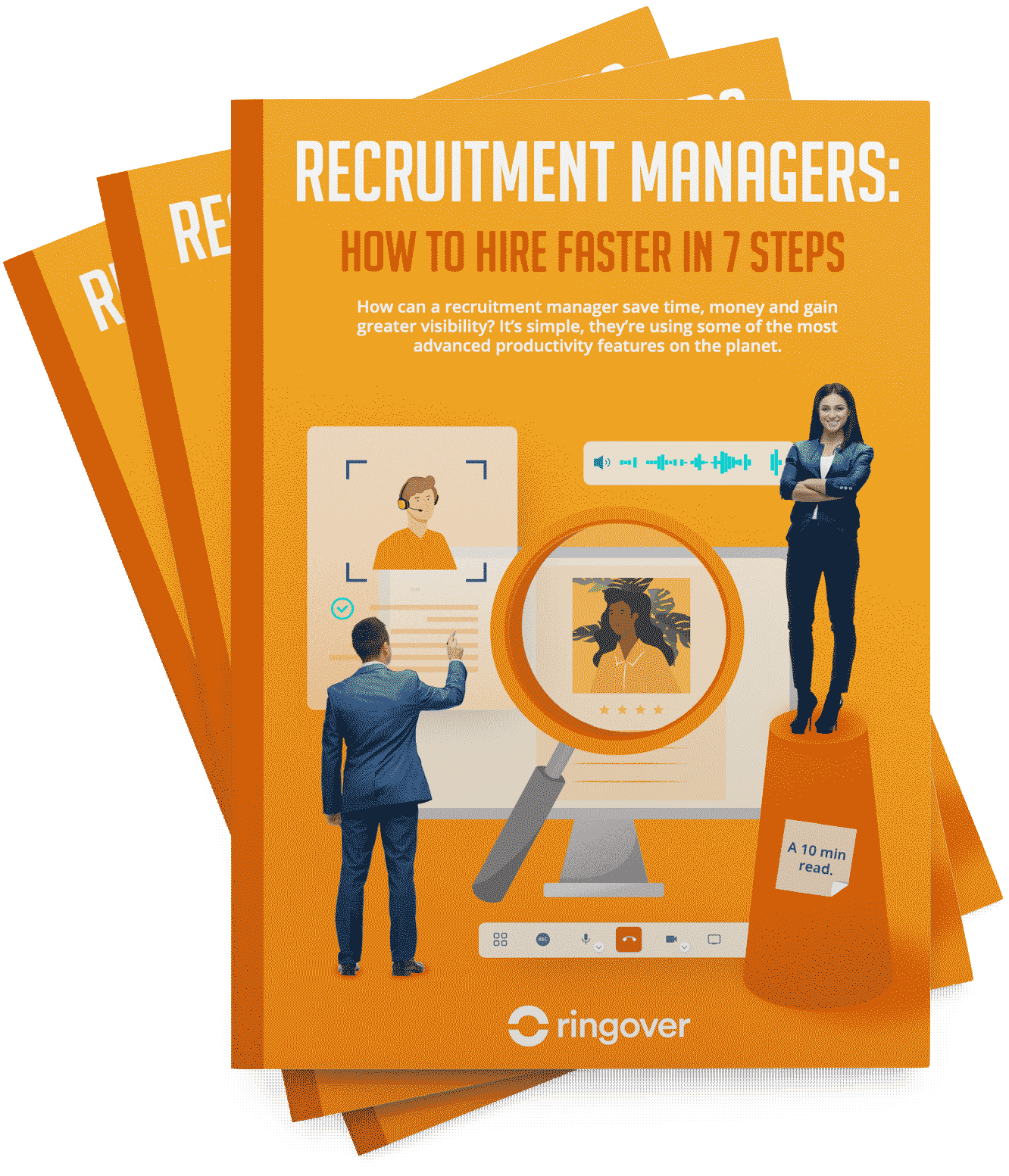Summary
- 10 Step Guide to How Staffing Agencies Work
- What to Expect from a Staffing Agency if You're an Employer
- What to Expect from a Staffing Agency if You're an Employee
- Does a Staffing Agency Charge a Fee?
- How to Decide if You Should Work with a Staffing Agency
- Advantages of Using a Staffing Agency
- Disadvantages of Using a Staffing Agency
- What to Remember
- How Do Staffing Agencies Work FAQ
Staffing agencies act as a bridge between employers and job seekers, simplifying the hiring process for both parties. These agencies specialise in finding, screening, and placing candidates in various types of positions, from temporary and contract roles to full-time, long-term employment.
Learn More About Ringover for Staffing10 Step Guide to How Staffing Agencies Work
Understanding the process of how staffing agencies work can be invaluable for both employers and job seekers. Here is a step-by-step guide to help you navigate the entire process:
Step 1: Client Requirement Analysis
The process begins with the staffing agency working closely with the client company to understand the specific requirements for the open position. This includes identifying the necessary skills, experience, and other relevant attributes for the role. The agency and the client also agree on the terms of the contract, including fees, responsibilities, and other particulars related to the hiring process.
Step 2: Job Posting and Promotion
Once the requirements are clear, the staffing agency creates detailed job listings based on the client's needs. These job listings are then promoted through various channels such as job boards, social media, and the agency's own network to attract potential candidates.
Step 3: Candidate Sourcing and Screening
The agency identifies potential candidates through databases, networks, and job platforms. Applications are reviewed, and candidates are screened based on their skills, experience, and fit for the role. This initial screening helps narrow down the pool of candidates to those who are most suitable for the position.
Business software like CRMs and ATS such as Bullhorn, Vincere, and Recruit CRM helps with this process, and also integrate with other business solutions like Ringover, which is an omnichannel contact center software and business phone system. These integrations provide key features like click-to-call and automatic data synchronisation, saving recruiters valuable time and enabling better candidate relationship management.
Step 4: Initial Interviews and Assessment
The agency conducts initial interviews to further assess the candidates' suitability for the role. Depending on the position, candidates may also undergo skill assessments or technical tests to evaluate their competencies. VoIP software like Ringover allows you to get in touch with candidates via their preferred communication channel, including videoconference, text messaging, unlimited calling, and more.
Step 5: Shortlisting and Client Review
After the initial interviews and assessments, the agency creates a shortlist of the most suitable candidates. This shortlist is then presented to the client for review and further evaluation. The client can then select candidates they wish to interview further.
Step 6: Client Interviews and Selection
The client conducts their own interviews with the shortlisted candidates. After these interviews, the client selects the most appropriate candidate and communicates their choice to the staffing agency.
Step 7: Job Offer and Onboarding
The staffing agency extends a job offer to the selected candidate on behalf of the client. The agency may also assist with the onboarding process, ensuring a smooth transition for the candidate into their new role.
Step 8: Follow-up and Feedback
After the candidate starts working, the staffing agency may conduct follow-up checks with both the client and the candidate to ensure satisfaction on both ends. Feedback is collected to understand the efficacy of the recruitment process and make any necessary adjustments in the future.
Step 9: Payment and Billing
The staffing agency handles the payment and billing process. This includes managing the candidate's payroll, tax rates, and generating reports. The agency ensures that all financial aspects are handled efficiently and accurately.
Step 10: Ongoing Support and Management
Finally, the staffing agency provides ongoing support and management for both the client and the candidate. This can include managing temporary or contract employees, handling any issues that arise, and ensuring compliance with employment laws and regulations.
What to Expect from a Staffing Agency if You're an Employer
Clear Communication and Expectations
A good staffing agency will start by defining your needs clearly. This involves creating a detailed job description that outlines the necessary skills, experience, and qualifications for the role.
The agency will also set realistic expectations about what the role entails, including timelines, salary ranges, and potential challenges the candidate might face. Regular communication is essential, and you should expect the agency to keep you updated on the recruitment process and seek your feedback promptly.
Quality Candidates
One of the primary expectations from a staffing agency is the delivery of high-quality candidates.
The agency should thoroughly vet candidates to ensure they meet the job requirements and fit well within your company culture. This includes verifying references, screening resumes, and conducting initial interviews to assess the candidates' suitability for the role.
Speed and Efficiency
In today's fast-paced job market, speed and efficiency are critical. You can expect a staffing agency to have a streamlined process for sourcing, screening, and shortlisting candidates quickly.
This ensures that you receive suitable candidates in a timely manner, helping you fill positions without undue delay.
Industry Knowledge and Expertise
A reputable staffing agency will have a deep understanding of your industry. This includes knowledge of the latest trends, salary benchmarks, and the specific skills required for different roles.
This expertise allows the agency to provide more relevant candidates and offer valuable insights into the hiring process.
Tailored Solutions
No two companies are alike, and a good staffing agency will understand your unique needs. They should provide customised solutions, such as tailoring the candidate search process, offering flexible contract options (like contract-to-hire), or providing additional services like onboarding support.
Reliability and Trustworthiness
Building a reliable and trustworthy relationship with the staffing agency is vital.
You should expect the agency to be honest about candidate availability, maintain confidentiality, and deliver on their promises. This trust is essential for a long-term and successful collaboration.
Cost-Effectiveness
While you are willing to pay for quality services, you also want to ensure you are getting good value for your money. The staffing agency should be transparent about their fees and provide a clear breakdown of what services are included.
They should also demonstrate a strong return on investment to help you understand the value they bring.
Ongoing Support
After the candidate is placed, the staffing agency should continue to provide support. This includes managing any issues that arise, ensuring compliance with employment laws, and conducting follow-up checks to ensure satisfaction on both ends. This ongoing support helps in maintaining a smooth and productive working relationship.
A VoIP software provides more than just unlimited calls, as it includes omnichannel communications so you can reach clients and candidates in a personalised and timely manner.
What to Expect from a Staffing Agency if You're an Employee
If you are considering working with a staffing agency to find employment, it is important to understand what you can expect from this relationship.
Here are some key aspects to consider:
Clear Job Descriptions and Expectations
A staffing agency will provide you with detailed job descriptions that outline the responsibilities, skills, and experience required for the role. This clarity helps ensure you understand what the job entails and whether it aligns with your career goals and skills. The agency will also inform you about the company culture, work hours, dress code, and other relevant details to help you prepare.
Support in the Application and Interview Process
The agency will assist you in preparing for interviews and applications. This includes resume review, practice interviews, and tips on how to present yourself effectively. They may also provide feedback on your performance during the initial screening process to help you improve.
Regular Communication and Updates
Expect regular communication from the staffing agency regarding the status of your application and any updates on the hiring process. They will keep you informed about any changes, additional requirements, or new opportunities that match your profile. This ongoing communication helps manage your expectations and keeps you engaged throughout the process.
Access to a Variety of Job Opportunities
Staffing agencies often have a wide range of job openings across different industries and companies. This gives you access to various opportunities that you might not find through other job search methods. The agency can match you with positions that fit your skills, experience, and career aspirations.
Temporary, Contract, or Full-Time Placement Options
Staffing agencies offer different types of employment arrangements, including temporary, contract, and full-time positions. Depending on your preferences and career goals, the agency can help you find the right type of job. Temporary or contract roles can be a great way to gain experience or fill a gap between full-time positions.
Ongoing Support and Feedback
After you are placed in a job, the staffing agency may continue to provide support. This includes feedback on your performance, assistance with any issues that arise, and help in navigating the company's policies and procedures. Regular check-ins can ensure you are satisfied with your role and address any concerns promptly.
Career Development and Growth Opportunities
A good staffing agency can also offer guidance on career development and growth opportunities. They may provide resources for skill enhancement, training programs, and advice on how to advance in your career. This support can be invaluable in helping you achieve your long-term career goals.
Fair Treatment and Compliance with Labor Laws
Expect the staffing agency to ensure that you are treated fairly and that all placements comply with labour laws and regulations. This includes proper payment, safe working conditions, and respect for your rights as an employee. The agency should maintain transparency and honesty in all their dealings with you. By understanding these expectations, you can better navigate the process of working with a staffing agency and maximise the benefits they offer.
Does a Staffing Agency Charge a Fee?
Yes, staffing agencies do charge fees for their services, which can significantly vary based on the type of placement, the industry, and the specific services provided. Here's an overview of the common fee structures:
Direct Hire Fees
For direct hires, agencies typically charge a percentage of the candidate's first-year salary as their fee. This percentage can range from 15% to 25%, or even higher, depending on the agency and the role's complexity. For example, for a candidate with an annual salary of £100,000, the fee could be anywhere between £15,000 and £25,000.
How to Decide if You Should Work with a Staffing Agency
Deciding to partner with a staffing agency requires a detailed assessment of your business needs, the advantages and possible disadvantages of using such an agency. Consider the following key points:
Evaluate Your Staffing Needs and Goals
Begin by defining your precise staffing requirements and long-term objectives. Pinpoint the skills, experience, and positions needed to bridge current and future gaps in your team.
This insight will guide you in determining if a staffing agency can source the right talent to meet these needs.
Assess Your Current Recruitment Process
Review the efficiency and effectiveness of your existing recruitment strategy. If you're finding that your in-house efforts are costly, time-consuming, or fail to attract the desired candidates, considering a staffing agency might be a more suitable option. These agencies excel in recruitment, allowing your team to concentrate on other essential duties.
Consider the Industry Expertise of the Agency
Verify that the staffing agency has specialized knowledge in your industry.
Agencies with sector-specific expertise can better grasp your unique challenges and supply candidates with the relevant experience and skills, which is essential for successful placements.
Review the Agency's Recruitment Process and Candidate Quality
Examine the agency's approach to sourcing, screening, and selecting candidates to ensure it meets your standards.
A rigorous vetting process, including preliminary interviews, skill assessments, and background checks, is vital for securing high-quality candidates.
Check the Agency's Reputation and References
Investigate the agency's track record by reviewing online feedback, client testimonials, and references. A strong reputation and positive reviews from past clients suggest reliability and the ability to deliver quality candidates.
Evaluate the Additional Services Offered
Consider any extra services the agency may offer, such as skills testing, candidate training, onboarding assistance, and payroll management. These services can enhance your hiring process and contribute to the long-term success of the placements.
Assess the Cost-Benefit Analysis
Compare the costs of using a staffing agency against managing recruitment internally.
Although there are fees involved, staffing agencies can save you time, reduce the burden on your current staff, and potentially decrease the overall cost of hiring by shortening the time to hire and enhancing the quality of candidates.
Consider the Flexibility and Adaptability
Reflect on the level of flexibility your workforce requires. Staffing agencies offer temporary, contract, or full-time placements, which allows you to adjust your staffing levels in response to business needs. This adaptability is especially valuable for businesses with variable staffing demands.
By thoroughly evaluating these aspects, you can make a well-informed decision on whether partnering with a staffing agency is the best move for your business.

Advantages of Using a Staffing Agency
Faster Hiring Process ✅
One of the most significant advantages of using a staffing agency is the speed at which they can fill open positions. Staffing agencies have streamlined processes and extensive networks, allowing them to source, screen, and present qualified candidates quickly. This reduces the time-to-hire, which is important for minimizing vacancy costs and maintaining business productivity.
Access to a Wider Pool of Qualified Candidates ✅
Staffing agencies have access to a large and diverse pool of candidates, many of whom are not actively seeking jobs through traditional channels. These agencies proactively reach out to candidates with the right skills and experience, increasing the chances of finding the perfect fit for the role. This access to a broader talent pool is particularly beneficial for companies looking to fill niche or specialized positions.
Cost Savings ✅
While staffing agencies charge fees, they can ultimately save companies money in several ways. They reduce the costs associated with lengthy recruitment processes, minimize the need for expensive job postings, and lower the risk of new hire turnover. Additionally, temporary or contract workers hired through agencies can help avoid overtime pay and reduce the financial impact of layoffs.
Expertise and Industry Knowledge ✅
Staffing agencies often specialize in specific industries and have deep knowledge of the hiring trends, salary benchmarks, and required skills within those sectors. This expertise helps in identifying and placing candidates who are well-suited to the company's needs, ensuring a better cultural and skill fit.
Reduced Workload and Increased Efficiency ✅
By outsourcing the recruitment process to a staffing agency, companies can free up their internal resources to focus on core business activities. The agency handles tasks such as resume screening, interviews, and background checks, allowing in-house teams to concentrate on higher-value tasks and maintain productivity.
Flexibility in Hiring ✅
Staffing agencies offer flexibility in terms of the type of hires they can facilitate. Whether you need temporary, contract, or full-time employees, these agencies can adapt to your changing workforce needs. This flexibility is particularly useful for companies experiencing rapid growth, seasonal fluctuations, or project-based hiring needs.
Confidentiality and Discretion ✅
For sensitive or high-level positions, staffing agencies can maintain confidentiality during the hiring process. This is essential for roles where public knowledge of the vacancy could be detrimental to the company, such as C-suite positions or other critical roles.
Improved Employee Retention ✅
Staffing agencies can help improve employee retention rates by ensuring that the right candidates are placed in the right roles. Temporary or contract employees who perform well can be converted to full-time employees, reducing the costs and risks associated with new hire turnover.
Reduced Hiring Risks ✅
Using a staffing agency reduces the risks associated with hiring new employees. These agencies thoroughly vet and screen candidates, ensuring that only the most qualified and suitable candidates are presented to the client. This minimizes the risk of poor hires and the subsequent costs of replacing them.
Disadvantages of Using a Staffing Agency
While staffing agencies offer numerous benefits, there are also several disadvantages to consider when deciding whether to use their services. Here are some of the key drawbacks:
Higher Costs ❌
One of the most significant disadvantages of using a staffing agency is the cost involved. Agencies typically charge a fee, which can be a percentage of the hired employee's salary or an hourly markup for temporary workers. For high-salary positions, these fees can be substantial, adding to the overall hiring costs.
Less Control Over the Hiring Process ❌
When you work with a staffing agency, you have less control over the recruitment process. The agency handles tasks such as candidate sourcing, screening, and initial interviews, which can limit your direct involvement in selecting the final candidates. This lack of control can be a disadvantage, especially if you have specific requirements or preferences that may not be fully understood by the agency.
Possibility of Misalignment with Company Culture ❌
Staffing agencies may not fully understand your company's culture, values, and specific needs, which can lead to potential mismatches between candidates and your organization. This misalignment can result in candidates who, despite having the right skills, do not fit well within your company's environment.
Limited Knowledge Transfer and Loyalty ❌
Temporary or contract employees hired through staffing agencies may have less incentive to invest in learning about your company's long-term goals and culture. This can lead to a lack of loyalty and a higher turnover rate, as these employees may be more inclined to seek other opportunities.
Confidentiality Concerns ❌
When using a staffing agency for executive or specialized positions, there is a risk that sensitive company information may be shared with candidates. Ensuring confidentiality is essential, and relying on an external agency can increase this risk.
Potential for Lower Quality Candidates ❌
The quality of candidates provided by an agency can vary. If the agency does not fully understand your hiring criteria or if they are not motivated to find the best candidates (especially in contingency-based models), you might receive candidates who are not the best fit for your needs.
Administrative and Time Commitment ❌
Working with a staffing agency still requires a significant time commitment from your team. You need to dedicate time to regular catch-up calls with the recruitment consultant, screening CVs, conducting interviews, and providing prompt feedback. This can be demanding, especially if you have other pressing responsibilities.
Legal and Compliance Issues ❌
There is a risk of legal issues when using a staffing agency, particularly with temporary employment contracts. Abusing temporary work arrangements can lead to legal complications, and any errors or process glitches by the agency could leave you vulnerable to lawsuits.
By understanding these disadvantages, you can make a more informed decision about whether using a staffing agency aligns with your business needs and goals.
What to Remember
Understanding how staffing agencies work can be a game-changer for both employers and job seekers. By leveraging the expertise of these agencies, businesses can streamline their hiring processes, save time and resources, and find high-quality candidates. For job seekers, staffing agencies offer access to a wide range of job opportunities and valuable support in the application and interview process.
To make the most of a staffing agency, remember to clearly communicate your needs, evaluate the agency's reputation and industry expertise, and consider the potential costs and benefits.
By taking these steps, you can harness the full potential of staffing agencies to achieve your hiring or career goals.
How Do Staffing Agencies Work FAQ
Is it a good idea to use a staffing agency?
Yes, using a staffing agency can be an excellent idea for both businesses and job seekers. Staffing agencies offer access to a larger talent pool, save time in the hiring process, and can reduce risks associated with hiring the wrong person. Businesses benefit from specialized recruiters who understand industry needs, ensuring high-quality candidates are matched quickly to job openings. Additionally, job seekers can find opportunities that may not be publicly advertised and receive career guidance from experienced recruiters.
What are the cons of getting hired through a staffing agency?
While staffing agencies offer many benefits, there are a few drawbacks. For employees, the positions may be temporary or project-based, which means less job security compared to full-time positions. Some agencies focus more on filling positions quickly, which can lead to potential mismatches between a candidate's career goals and the role offered. Additionally, the compensation offered through a staffing agency may be lower than what a candidate could negotiate on their own.
Are staffing agencies trustworthy?
In general, most staffing agencies are trustworthy, but it is important to do your research. Look for established agencies with good reputations and transparent processes. Some agencies may be more focused on filling positions quickly than on making the right fit for both the employer and employee, so ensure that the agency you're working with has a thorough vetting process and good client testimonials.
Published on October 11, 2024.



